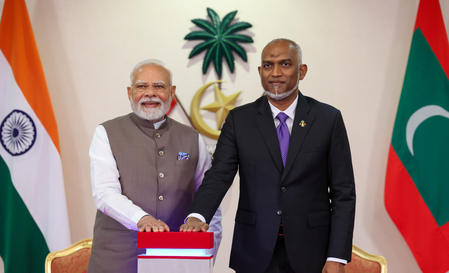

New Delhi, Aug 7 (IANS) The recent development in India-Maldives ties is an important strategic move in India’s foreign policy. The move apart from being a goodwill gesture showcases India’s reassertion of primacy in the Indian Ocean, where China’s presence is evident by its persistent influence, a report highlighted on Thursday.
Maldives through the reset of bilateral ties gets India’s economic assistance, robust security cooperation and people-to-people connection, pushing away China’s approach of “debt-trap” diplomacy and transactional approach, India Narrative reported.
Apart from being a tourist destination, Maldives has a critical strategic position at the Indian Ocean sea lanes, which is the world’s most essential maritime routes for commerce and energy. Maldives serves as an important security outpost against China’s military cooperation agreements.
Prime Minister Narendra Modi’s visit to Maldives in July was the perfect combination of substantive action and symbolic reset.
PM Modi was on a two-day State Visit to Maldives at the invitation of President Mohamed Muizzu, where he attended the Independence Day celebrations of Maldives as the ‘Guest of Honour’ at Republic Square in Male. He held bilateral talks with Maldives President and met political leaders of several parties.
During the visit, PM Modi announced that India will provide a Line of Credit of Rs 4,850 crore and debt relief to Maldives. These decisions were not only handouts but deliberate geopolitical tools. By giving credit in rupees, India pushes away the traps of foreign currency dependencies that China exploits and boosts economic interdependence under transparent, mutually respectful terms. This decision contrasts with China’s lending practices that causes burden on states with unsustainable obligations, often resulting in compromised sovereignty, according to the report.
India’s decision to help Maldivian security forces with training, equipment, and capacity-building is important as it demonstrates New Delhi’s refusal to give up maritime strategic influence and reminds China that its “string of pearls” approach will not function without resistance. This decision of India demonstrates an advanced understanding of modern statecraft.
Like other small nations, Maldives skillfully hedges between big powers for its benefits. However, India’s layered, patient and generous engagement has impeded China’s influence, the report said. . This approach demonstrates the essence of India’s ‘Neighbourhood First’ and ‘SAGAR’ policy.
The reset of India-Maldives ties showcases that influence stems from nuanced, inclusive, respectful approach and partnership instead of hard power or financial assistance. India wants to continue this momentum by using economic investment, security collaboration, and cultural diplomacy, thereby ensuring a stable and cooperative Indian Ocean order despite China’s aggressive measures.
The reset in bilateral ties, the IN report highlighted, is more than just good diplomacy: It is an indispensable plan where India protects its core security concerns and elevates its international standing as a responsible regional power. India’s approach based on respect, generosity, and pragmatic realism is the key to future cooperation.
–IANS
int/akl/as
